High Schoolers Discover “What It Takes” to Become Engineers During Grainger Engineering’s Summer 2020 Virtual Camp
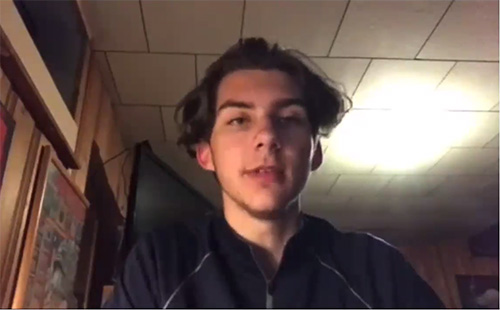
Camper Luke Lattyak participating in a "What It Takes" Zoom meeting.
July 17, 2020
While Illinois’ many STEM residential summer camps were cancelled this summer due to COVID-19, the many high schoolers who had signed up prior to the pandemic, plus a few minority students who were recruited, were still able to learn about the different engineering disciplines and what being an engineer might be like via Grainger College of Engineering’s “What It Takes” Virtual Summer Camp.
Close to 500 students participated in the virtual camp’s two, 2-week sessions: 230 in the June 21–July 2 session, and 240 in the July 5–16 session. Campers explored the various engineering fields through presentations, speakers, demonstrations, and hands-on labs and projects. They took virtual field trips to working research labs on campus and related industries. They also participated in pre-recorded virtual tours of campus facilities. Campers were comprised of students who had originally signed up for residential camps prior to the COVID-19 quarantine, plus, Exelon contributed scholarship funding specifically for Chicago students, which allowed the team to offer some additional seats to students of partner organizations in the Chicago area like the Chicago PreCollege Science and Engineering program.
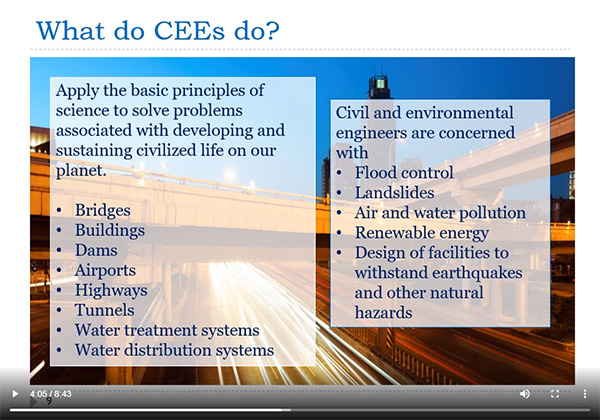
A slide from CEE's week one "At Your Convenience" session about what Civil and Environmental Engineers do.
The What It Takes Virtual Summer Camp gave campers the opportunity to explore the following 12 engineering disciplines: Aerospace Engineering (Aero); Agricultural and Biological Engineering (ABE); Bioengineering (BioE); Chemical Engineering (ChemE); Civil and Environmental Engineering (CEE); Computer Engineering (CE); Computer Science (CS); Electrical Engineering (EE); Industrial and Enterprise Systems Engineering (IESE); Materials, Science and Engineering (MatSE); Mechanical Science and Engineering (MechSE); and Nuclear, Plasma, & Radiological Engineering (NPRE).
Camp activities took place in two main ways: via LIVE sessions using video conferencing or webinar tools, and through AYC (At-Your-Convenience) sessions, which featured videos, articles, and labs campers accessed through a password-protected website.
For instance, during Week One, Engineering Exploration, campers participated in twelve “AYC” sessions, one for each engineering discipline mentioned above. “So that was kind of their little sampler,” Hebert explains. “We got a little of each major.”
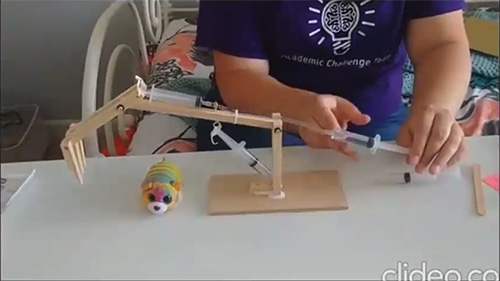
A camper builds a hydraulic machine during an ABE hands-on activity.
During Week Two, called “Deeper Dive,” students did a three-to-five-hour mini course for each of the three disciplines they had chosen in order to explore further. “The design was, ‘Okay. Now, you’ve gotten a little taste; now pick some that you want to dive into more deeply,’” Hebert continues. These sessions were LIVE with opportunities to interact with the experts from these fields.
In addition, campers completed hands-on labs and projects using materials from lab kits mailed to their homes. “There’s some really cool stuff!” Hebert asserts. Some of the activities included making your own electrostatic detector (NPRE); exploring non-Newtonian fluids (including the ever-popular slime, courtesy of ChemE); building hydraulic machines (ABE); making gliders (Aero); using memory metals to build from scratch an airplane launcher to launch paper airplanes or gliders (MechSE), and more.
Regarding the positive benefits of the hands-on activities included as part of the camp’s curriculum, Hebert explains, “Cause that’s how we learn.”
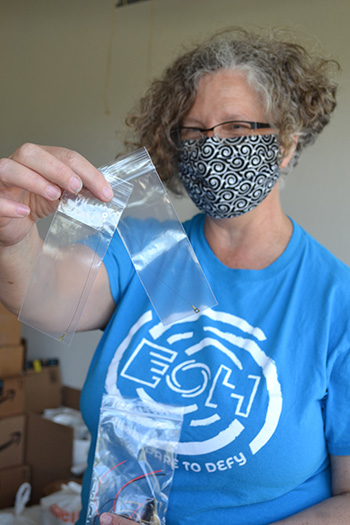
During the camp's Saturday kit-making session, Lara Hebert exhibits packets of memory metal to be included in a kit.
She further acknowledges that, “You reading about it…it doesn’t stick with you, and it doesn’t become tangible. It’s not something that you remember. It’s not something that raises questions where you want to know more. It’s from doing it. It’s from trying it and things not working, and then trying it in a different way that presents that just-right level of challenge that keeps us excited about what we’re doing.”
Another camp activity consisted of virtual tours. For instance, one virtual field trip, which was part of the NPRE session, was to Exelon’s nuclear power plant called Limerick in Pennsylvania. There were also virtual tours available of campus facilities, including a couple of lab tours which departments had already recorded or recorded especially for this event.
Additionally, campers were encouraged to choose from among several breakout sessions available during the lunch hours and evening small-group meeting blocks. These sessions addressed topics related to the college application process, college life, and tools or supports for college and career success. For instance, the Writer’s Workshop (a service located in the undergraduate library and funded by the English Department) provided four different sessions on writing a standout college essay.
Plus, because female campers had originally signed up for a more women-focused experience, Hebert admits, “We wanted to still provide some of those possibilities.” So student ambassadors from WIE (Women in Engineering), and the WIE director, Angie Wolters, provided a session regarding the College’s EAGER emphasis (Engineers Aiming for Gender Equity and Representation), whose goal is to increase the number of women and gender non-binary students pursuing STEM majors and careers. “That provided the women an opportunity to talk to other women who are at the university,” says Hebert.
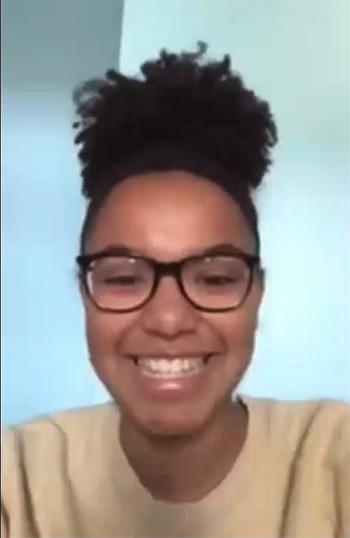
Camper Joanie Daye participates in the "What It Takes" camp via Zoom.
An additional breakout session featured Victor Cervantes, Assistant Director of the Morrill Engineering Program, which seeks to increase the number of minority students in engineering. As part of his talk, “What I Wish I Knew in High School,” he shared his story of going into engineering and lessons learned. Also featured during this session was Isabelle Diaz, the president of the Illinois chapter of SHPE (the Society for Hispanic Professional Engineers). who talked about what she wished she had known heading into college.
A further goal of the camp was to allow campers to meet new people and engage socially as well as academically by participating in daily small-group sessions comprised of 10 campers and done via web conference. Facilitated by University of Illinois engineering undergrad students who served as guides for the week, for one hour, from 4:00-6:30pm, campers would participate in LIVE small-group meetings with their counselor.
Hebert shares about the networking/social aspect of the camp. “One of the things that we really wanted to work towards was to try to figure out ways that the campers could leave camp and kind of have some of those personal ties like you'd get when you're in a face-to-face camp—that you leave with relationships that you want to continue, and you want to stay in touch with some people, and you want to know more.” That’s why they decided to go full scale with the counselors and doing social activities. Their goal was to try things that would “emulate those hanging-out-at-the dorm experiences, social activities.”
Campers did a number of different sorts of things to hang out socially. Some were involved in less formal chat using the Discord platform, often used for gamers. Campers who liked that sort of environment navigated over there, and started up chats, and on game nights, they would hop on to do some gaming together. Socialization times also featured organized games. For instance, during sessions with their camp counselor, campers played a Pictionary-type game called Scribed Leo and did scavenger hunts. Plus the camp even held a shark tank competition.
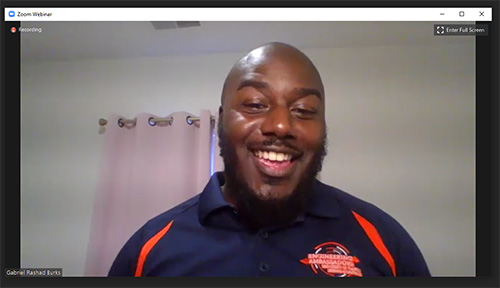
During the Closing Ceremony for both of the sessions, Bioengineering's Gabriel Burks shared with the campers about next steps and an authenic engineer's strengths.
To cap off both of the two-week camps, on Thursday of Week Two from 4:00-5:30 pm, there was a live Closing Ceremonies with a guest speaker, as well as a celebration of accomplishments, and brief testimonials by campers. For example, sharing with the campers about next steps was Dr. Gabriel Burks of Bioengineering, who described authentic engineers. Claiming that authentic engineers are resilient, collaborative, problem solvers, utilize creativity and think outside the box, are action oriented, and are constantly curious, he challenged the high schoolers, “Are you built like an authentic engineer? If so, then I know a place that will take you to the next level!”
Campers also received a number of awards at the closing ceremonies. For example, the Junior Counselor award was given to campers who showed diligence and helpfulness toward other campers by answering questions and helping solve technical difficulties. The “Shark Bait” award was awarded to the winner of the Shark Tank activity, where a team of students designed then demonstrated a product that could solve one a world problem. The “Adaptability Award” recognized students who had adapted well to the virtual camp and had made the most of every aspect of camp. The “Deep Diver” award recognized campers who embraced their curiosity and went out of their way to explore topics outside of the activities and lab kits that they were given, exploring engineering in general because they were interested in all they’d learned during camp. The "Cole Points" award was established by one of the Counselors (named Cole) who gave points for participation. Finally, the "Persistence Award" was given to campoers who persisted even when facing challenges during camp, whether technological or just with the activities and labs in general.
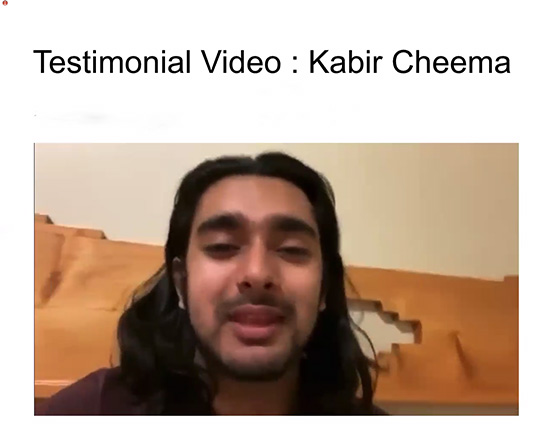
Kabir Cheema presents his testimonial during the July 2nd Closing Ceremony on Zoom.
A number of campers also had the opportunity to share testimonial videos during the closing ceremonies. For instance, Kabir Cheema from Arizona shared that the camp was a fun experience and because of it, actually changed his career goal—to engineering!
“I want to say like before this, I wasn't interested in engineering at, in like almost any way, but now I really want to be an engineer. So it's a pretty cool change to see because of the Arduino kit that you sent home…Coding different things and seeing how it would change what happened on the breadboard was so cool.”
He also loved the aerospace engineering activities, where they built gliders and did space landers. “It was so cool to see and think about how in a few years, I'm going to be doing that on a bigger scale.” He also found the socialization activities meaningful. “Also like meeting all the campers, like on a game night last Friday, it was really fun to play Mafia for two hours straight. It was one of the best nights I've had in quarantine.” Cheema adds his appreciation for the camp: “So I just want to say thank you, guys, for making this experience so great. I'm really gonna miss it a lot, and I hope to see you guys at the University of Illinois students. So thanks.”
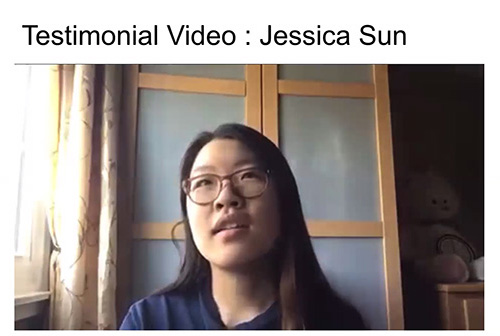
Jessica Sun shares her testimonial during 1st camp's Closing Ceremony Zoom session.
Jessica Sun from Downers Grove, Illinois reports that the WYSE “What It Takes” summer camp was probably one of the best and informal experiences she’d ever had. “The camp was super well put together,” she declares, “because the first week we had to explore the majority of engineering branches, and then the second week could pick and choose which branches we wanted to go further into.” She claims that one of her favorite activities was building the hydraulic lifter. “It was fun to see a real-life example of engineering, and then actually being able to assemble it and have it work was incredible,” she says.
Another camper, Ben Houle, shares why he really enjoyed this camp, particularly the department activities. “I really like being able to build something hands on, but then also learn a lot about engineering, which is very interesting to me. One great example of this is the agricultural engineering activity. I got to build a hydraulic scissor lift, which was cool, cause it was cool to see it go and move, but it was also fun to learn about hydraulics and how they're used and how they incorporate into agricultural engineering.”
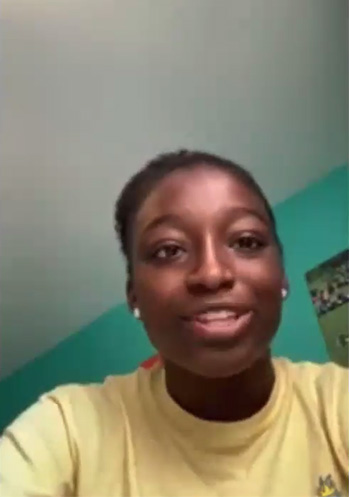
Camper Nina Montez shares how the camp impacted her with those attending the Closing Ceremony.
He also enjoyed working in small groups. “I also really like the group aspect of this camp. I like working in groups and the opportunity given to me to meet new people from different places that I would have never been able to meet before with similar interests. To me, that was really cool and is part of the reason I really liked this camp.”
Camper Nina Montez from Chicago says she really enjoyed this camp because she felt “WYSE did a great job making the best out of a tough situation, especially because we were in prison.” She says she loved the daily zooms and always looked forward to them, especially the “deep discussions around those categories.” She says her favorite activity during the camp was the aerospace engineering mini course.
“We were tasked with building a glider to help an egg land on a planet without getting damaged. Previous to this camp, I had never experienced anything in the aerospace field. I really enjoyed learning about how thrust, life, drag, and velocity affect flying objects.”
Regarding how the camp impacted her interest in engineering, Montez acknowledges, “I learned how to go through the design process, and I was able to collaborate with my professors and classmates. This class has really helped me to find my passion for engineering and improve my skills in other fields.”
Sharing a testimonial from the 2nd session was Madison Frankenthor who thanked the WYSE team for the past two weeks, admitting that, “It's definitely been more fun and collaborative than I ever thought possible for an online camp.”
In addition to learning about engineering, Frankenthor was also grateful for the information about college.
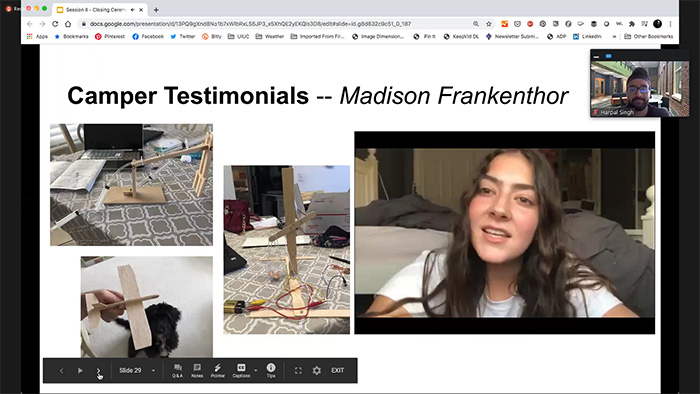
During the July 16th Closing Ceremony of Session 2, Madison Frankenthor mentions some of her favorite aspects of the camp as part her testimonial.
“Not only have I just learned so much about engineering in general,” she acknowledges, “but I learned a lot about college life and admissions that I know will help me out in the future. And I just want to say thank you to the counselors who shared their experiences, because it's definitely something I will reference back to in the coming years.”
She also appreciated the relationship building. “I really loved being able to connect with my fellow campers and my counselors on a deeper level than I thought was going to happen because we were connecting online and we're not in person, but this is something I really enjoy doing. And I learned a lot from my peers. So for that, I'm very thankful.”
Frankenthor particularly enjoyed the agricultural and biological engineering activity, admitting: “I had a lot of fun doing the hydraulics, and I know I’ll be playing with that in the future.”
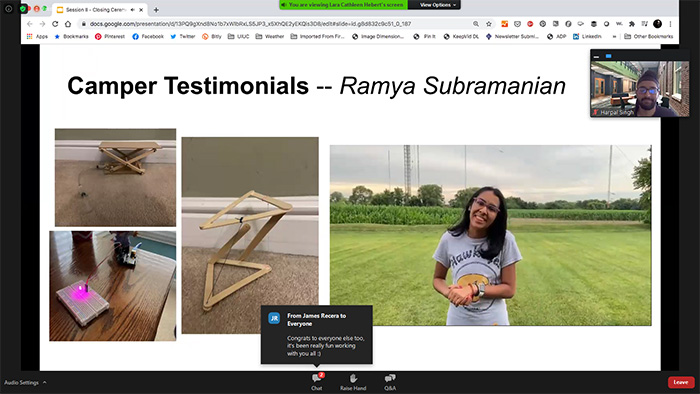
During her testimonial shared at the July 16th Closing Ceremony of Session 2, Ramnya Subramainian mentions the things she most enjoyed about the virtual camp.
Another camper from the second session, Ramya Subramanian, shares some of the benefits of the camp. “WYSE gave me the opportunity to experience about 12 to 15 majors and understand what they were about through hands-on activities. Additionally, I got to meet many students and professors from UIUC, which was great because I got to understand their experiences. And I was able to understand what I should expect in the upcoming years.”
She touches on several of her favorite activities, including the Shark Tank project. “My group created a solar powered drone, and it's so much fun to work with others and put our skills to use and get to know them better too.” She also appreciated the civil engineering ten degree structure, “because at the end, when I put that last piece in, I did not expect it to stand, but that last piece is what made it work and made all the other stuff makes sense.”Subramainian also enjoyed doing the breadboard and learning about computer engineering, which she might major in in college. “I love those because it showed me the hardware and software aspects of computer engineering. I was able to understand that and it showed me what I may want to do when I go to college.”
Lara Hebert and her WYSE (Worldwide Youth in Science and Engineering) team, Illinois’ long-standing summer camp program, learned in early April that they might need to think differently—to consider alternatives. So she held a meeting of all the camp coordinators across the departments, and decided as a group to think about virtual options…just in case. When the University decided there would be no summer camps, they committed to doing a virtual camp.
Hebert shares why she and her colleagues were willing to tackle converting much of the programming from their face-to-face, residential STEM camps—even starting from scratch in numerous instances—into a virtual format.
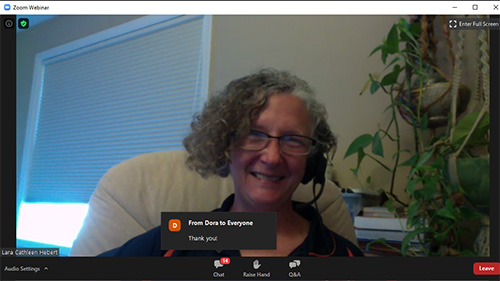
Lara Hebert chats with "What It Takes" participants during the July 2nd Closing Ceremony of the 1st camp session.
“Well, we knew that there were a lot of campers who were going to be disappointed if we ended up saying, ‘Sorry, no camp!’ We knew that in the midst of all those campers, there are a lot of them who are seniors and that they're going to be applying to college.”
Indicating that it's already been really hard on the students, having to go home mid-year and not see their friends, and be stuck at home, she adds, “So, we didn't want to leave them hanging. As best as we could, we really wanted to provide them with something that was going to give them a positive experience with the university, and especially with engineering.”
She acknowledges that sitting down and designing what the camp would look like had been a Herculean task. “We were pretty ambitious,” she admits, “and it's been a lot of hard work, but it's been a big team and a lot of hands going into it, which made it possible.”
Story and photographs by Elizabeth Innes, Communications Specialist, I-STEM Education Initiative.
More: 8-12 Outreach, Summer Camp, WYSE, 2020
For additional I-STEM articles on engineering camps, please see:
- GLEE GAMES Camp Seeks to Spark High School Girls' Interest in Electrical Engineering
- MechSE's WYSE Camp Helps High School Students Explore Mechanical Engineering
- G.A.M.E.S. Campers Learn about Bioengineering While Breaking Down Stereotypes
- High School Girls Discover Chemical & Biomolecular Engineering at GAMES Camp
- Girls Experience Electrical Engineering First-Hand at the 2016 GLEE GAMES Camp
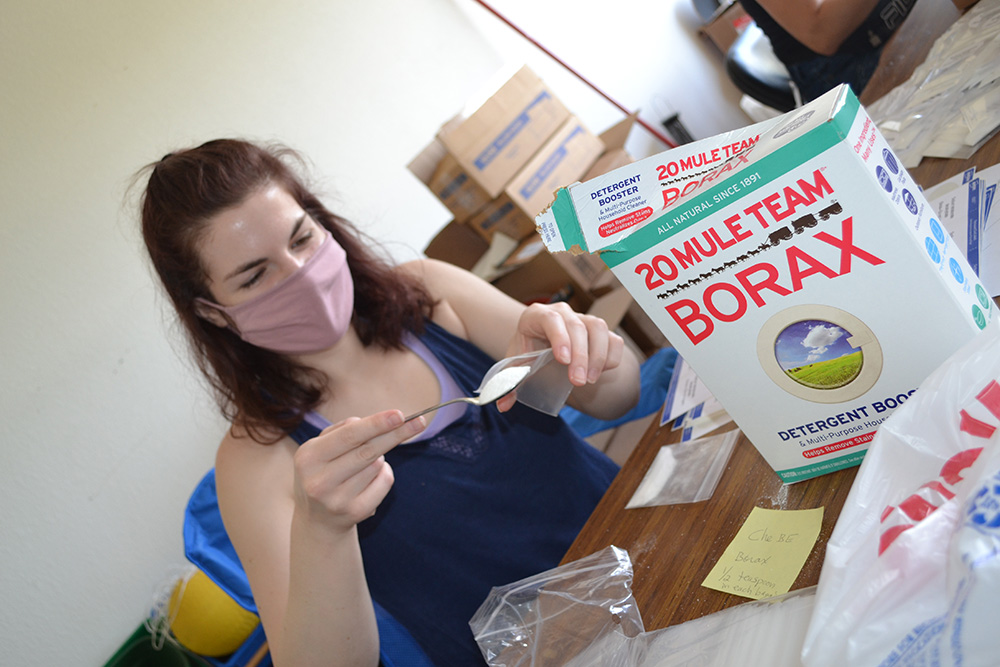
During the Saturday kit-making session, a volunteer adds Borax to a packet to be used in the Non-Newtonian Fluids hands-on activity.
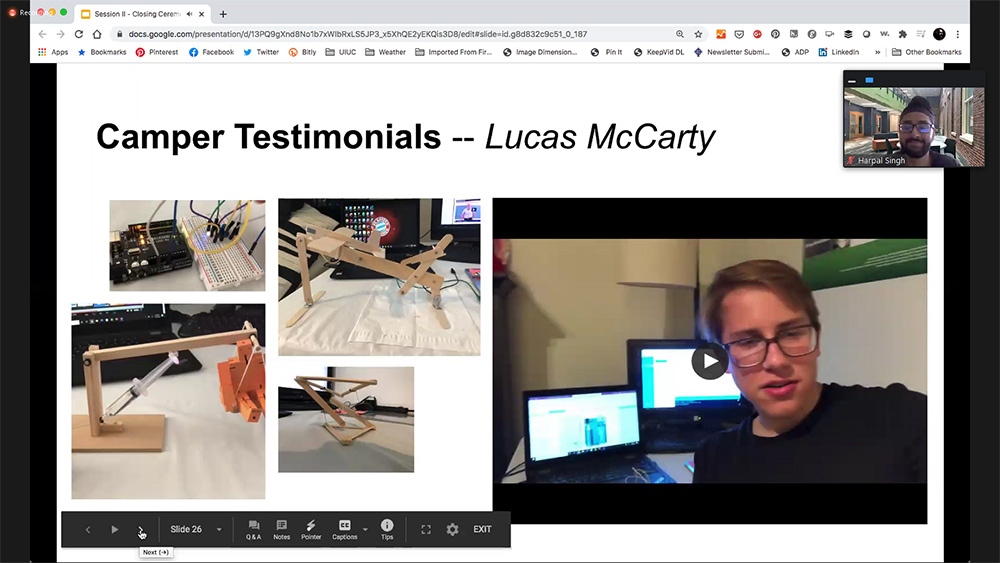
Lucas McCarty presents his testimonial during the Closing Ceremony of Session 2.













.jpg)
















